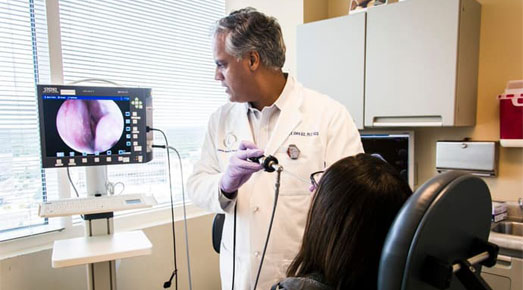ALLERGY TREATMENT

Atlanta’s Choice For Allergy Care
Do you sometimes wake up gasping for air, or your throat is so dry you need to get up and get a drink? Does your nose stop up when you sleep on your back, but open back up when you turn on your side? Do you snore? Seemingly out of the blue, do you start sneezing and your nose start running? Do you have a fear of being stung by a bee or wasp and your reaction to that sting? Do certain foods make you sick?
If you answered “yes” to any of these questions, you may be one of the more than 50 million Americans who suffer from allergies. If you suspect you have may have one or more allergies, contact the Sinus Institute of Atlanta for an appointment to discuss you symptoms, concerns, and determine if allergy testing and treatment is appropriate for you.
TYPES OF ALLERGY TREATMENT
There are three different types of allergy treatments: environmental elimination, suppression with medication and allergy shots.
Environmental elimination is the best method of treatment. This may involve decreasing the level of allergens in your home or work environment, if possible. Sometimes certain types of food are to be avoided. However, sometimes this can be difficult if you are allergic to allergens that are widespread such as grass or trees. Saline washes of the nose can help remove inhaled allergens.
Suppression with medication is probably the most commonly used method for treating allergies. This involves the use of antihistamines (we generally use prescription anti-histamines that are non-sedating so they do not interfere with your daily work or play), topical nasal steroid sprays or occasionally, systemic steroid pills. Newer medication that prevents the allergic response are coming available and promise to improve our scope of allergy medications.
An allergy shot treatment program is 1-2 year commitment on the part of the patient to take shots about once a week in an effort to eliminate the body’s overreaction to allergens. Allergy shots help relieve allergy symptoms by helping your body fight the allergen. When you get shots of the allergen, your body starts making antibodies to the allergen. These antibodies help block the effects of the allergen the next time you have contact with it. Because the antibodies block the way your body reacts to the allergen, your allergy symptoms become less severe. After many allergy shots, you might start to get relief from your allergy symptoms. This relief will last for a long time. It usually takes 6 months or more of shots before you start feeling better and notice relief of your allergy symptoms
Allergy is a complex problem which unfortunately affects a large number of people. You are welcome to make an appointment with our doctors at 404-257-1589 to discuss you symptoms to determine if allergy testing and treatment are appropriate for you.

TESTING
At AI4ENT, your allergy consultation will be overseen by Dr. Pradeep K. Sinha. As Atlanta’s preeminent ENT doctor, Dr. Sinha, is Board Certified in Otolaryngology-Head and Neck Surgery, the study of ear, nose and throat, as well as Facial Plastic and Reconstructive Surgery. With a professional career that spans over three decades, Dr. Sinha specializes in medical and surgical management of sinus problems. At your appointment, Dr. Sinha will listen to your concerns, obtain a detailed medical history, examine you, and evaluate your symptoms. He may perform skin or blood tests to determine what type of allergic disease you have and the causes of your symptoms.
Allergy testing is performed to determine the specific substances that cause an allergic reaction in an individual. They may also be used to determine if a group of symptoms is a true allergic reaction (involving antibodies and histamine release). At AI4ENT, you will be given a physical exam, and tests will be performed to determine your allergens. Good allergy treatment is based on your medical history and the severity of your symptoms.

WHEN ARE MY SYMPTOMS CONSIDERED ALLERGIES?
Seasonal allergies are typically easy to determine if symptoms begin or worsen at the onset of spring or fall. These allergies are usually caused by pollen and mold spores released from flowering plants, grasses or ragweed. Symptoms of an allergy attack include congestion, clear nasal discharge, sneezing, itchy eyes, watery eyes, or a scratchy throat. Our ENT allergy specialists offer allergy evaluations and treatments, like sublingual immunotherapy (allergy drops). Please contact us if you’re interested in learning more about our allergy services.
THE DIFFERENCE BETWEEN ALLERGIES AND SINUSITIS
When allergens enter our bodies through airways, histamines are released, causing a variety of unpleasant symptoms as an attempt to fight off these foreign substances. Normally, our sinuses allow mucus to drain through the nasal passages, but during allergy season these passages become swollen and inflamed, preventing drainage.
Built-up fluid in the sinuses causes congestion, pain and pressure, and if left untreated, can lead to an infection known as sinusitis. In severe cases, symptoms of sinusitis can last up to 4 months or longer. Knowing whether you have allergies or sinusitis is key to obtaining the treatment your body needs.
WHEN MY ALLERGY SYMPTOMS ARE CONSIDERED SINUSITIS?
Symptoms of allergies and sinusitis often overlap. If your symptoms worsen, such as you notice your snot has taken on a consistently yellow, green or grey tint or you begin experiencing great fatigue and pain in the face, you may have developed sinusitis.
In some cases, sinusitis symptoms can last twelve weeks or longer, even if treated with medication, causing prolonged sinus swelling and inflammation. This is referred to as chronic sinusitis and symptoms include frequent sinus headaches, constant congestion, facial pressure and more. Chronic sinusitis impacts overall quality of life, causing you to feel generally lousy all the time. In addition, chronic sinusitis can cause damage to the sinus cavities and bones, requiring invasive surgery. Traditional sinus surgery involves entering the nasal passage and surgically removing shards of bone and tissue to open the blocked sinuses.
However, an outpatient, non-invasive option is now available at our office: Balloon Sinuplasty. This procedure entails inserting a small balloon into the blocked passageways and inflating it to gently expand the opening, maintaining tissue integrity, and providing patients with significant symptom relief. Dr. Sinha is a leader in his field, with more Balloon Sinuplasty experience than any other medical professionals in the area. He is able to provide his chronic sinusitis patients with significant relief from their suffering using this life-changing procedure.
Contact the AI4ENT today to determine whether your symptoms are allergy-related or sinusitis or if you’re interested in learning more about Balloon Sinuplasty.

ALLERGIC SYMPTOMS TREATMENT
This is the step where you take control of your allergies and get relief from your allergic symptoms. Those substances that cause your allergic reactions are known as “triggers.” Avoiding those triggers is the number one way to control allergies and asthma. For example, wear a dust mask when performing housework or yardwork. Avoid furry pets, stay indoors during peak pollen seasons, wash linens at least once a week, and change the filter on your air conditioner. Antihistamines help relieve the symptoms of nasal allergies that lead to inflammation and infections.
At the AI4ENT, we may suggest one or more three different types of allergy treatments: environmental elimination, suppression with medication and sublingual immunotherapy.
Environmental elimination is the best method of treatment for allergies. This may involve decreasing the level of allergens in your home or work environment, if possible. Sometimes certain types of food are to be avoided. However, sometimes this can be difficult if you are allergic to allergens that are widespread such as grass or trees. Saline washes of the nose can help remove inhaled allergens.
MEDICATION THERAPY
If you feel like you cannot avoid allergens, suppression with medication is probably the most common method used for treating allergies with decongestants and antihistamines being the most common allergy medications. Generally, we use prescription antihistamines that are non-sedating so they do not interfere with your daily work or play. Decongestants are used for quick, temporary relief of nasal and sinus congestion. They can cause trouble sleeping, headache, increased blood pressure and irritability. Topical nasal steroid sprays or occasionally, systemic steroid pills may also be recommended. They help to reduce a stuffy nose, runny nose, sneezing and itching. Other medications work by preventing the release of the chemicals that cause allergic reactions. Corticosteroids are effective in treating inflammation in your nose.
SUBLINGUAL IMMUNOTHERAPY (SLIT)
Sublingual immunotherapy (SLIT) is an alternative way to treat allergies without injections. Currently, the only forms of SLIT approved by the FDA are tablets for ragweed, northern pasture grasses like timothy and dust mites. Tablets used under the tongue boost tolerance to the substance you’re allergic to and reduce symptoms. Allergy drops are not FDA-approved and are off-label in the United States. They are not covered by most insurance, Medicare or Medicaid.
CONSULTATION
Allergies are complex problems, which unfortunately affect many people, including children and pregnant women, and it is important to work with an experienced and knowledgeable physician to create a plan to manage your allergies.
Your first step to understanding and treating your allergic problems is to contact the AI4ENT to schedule an appointment to see a board-certified allergist.
